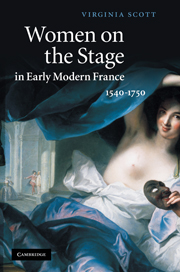Book contents
- Frontmatter
- Contents
- Acknowledgments
- Introduction
- 1 The actress and the anecdote
- 2 “So perverse was her wantonness”: antitheatricalism and the actress
- 3 In the beginning: “12 livres per year”
- 4 “Those diverting little ways”: 1630–1640
- 5 Mademoiselle L'Étoile: 1640–1700
- 6 “Embellished by art”: 1680–1720
- 7 Lives and afterlives: 1700–2010
- Bibliography
- Index
3 - In the beginning: “12 livres per year”
Published online by Cambridge University Press: 03 May 2011
- Frontmatter
- Contents
- Acknowledgments
- Introduction
- 1 The actress and the anecdote
- 2 “So perverse was her wantonness”: antitheatricalism and the actress
- 3 In the beginning: “12 livres per year”
- 4 “Those diverting little ways”: 1630–1640
- 5 Mademoiselle L'Étoile: 1640–1700
- 6 “Embellished by art”: 1680–1720
- 7 Lives and afterlives: 1700–2010
- Bibliography
- Index
Summary
BEFORE 1600
In the beginning there were a few women in France who braved the wrath of the Roman church, broke through social barriers, and went on the stage – maybe because they wanted to, maybe because they had to, maybe out of serendipity. We have no way of knowing. What we have known since 1888 is that a woman named “Marie Ferré, or Fairet, actress and acrobat, was contracted to Antoine de L'Esperonnière's troupe in 1545 in Bourges.” Ferré was the wife of Michel Fasset, a bateleur, or street entertainer, who lived in Normandy and was not present when the contract was signed. Given that circumstance, Ferré was permitted to sign for herself, but with the stipulation that if her husband did not approve, the contract would be void. She agreed to travel with L'Esperonnière and perform the “antiquailles de Rome” or other “histoires, morales, farces et sobressaults,” that is, histories, moralities, farces, and acrobatics. In return she was to be nourished and lodged and to receive the sum of 12 livres tournois per year.
This contractual arrangement is not what we might have expected from what we know of the professional theatre later on in seventeenth-century France; Ferré is to be an employee of L'Esperonnière, not a sharer in the troupe's income. The contract does, however, require her to share any gifts she receives of money or clothing with Gaillarde, the wife of the director and, presumably, also a performer.
- Type
- Chapter
- Information
- Women on the Stage in Early Modern France1540–1750, pp. 59 - 100Publisher: Cambridge University PressPrint publication year: 2010



